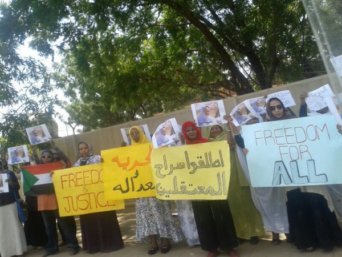- About
- Topics
- Picks
- Audio
- Story
- In-Depth
- Opinion
- News
- Donate
- Signup for our newsletterOur Editors' Best Picks.Send
Read, Debate: Engage.
Sudanese national security officials have detained dozens of students and activists – many of whom are still in custody – without charge since mid-April 2016, during protests on university campuses.
Some have been held for more than a month. Others are held in locations that the government has not revealed, without access to lawyers or contact with family, putting them at increased risk of torture.
“Sudan is cracking down on activists, students, and even their lawyers, with abusive and thuggish tactics,” said Daniel Bekele, Africa director at Human Rights Watch. “The government should put a stop to these tactics, immediately make the whereabouts of all detainees known, and release anyone being held without charge.”
The Sudanese government has repeatedly and violently cracked down on protests, including in September and October 2013, when security forces killed more than 170 protesters. Authorities have arbitrarily detained, tortured, and otherwise ill-treated detained protestors, including using sexual violence on female students.
Starting in mid-April 2016, government security forces, including national security and riot police, clamped down on student demonstrations against the sale of Khartoum University buildings, as well as earlier detention of protesters and a range of other issues at other campuses across Sudan.
Government forces have used tear gas, rubber bullets, and batons – and in some cases live ammunition – to break up protests and arrest scores of protesters. Reports that armed pro-government student groups are helping government security forces to break up protests, including with live ammunition, are of particular concern, Human Rights Watch said. Two students were killed and many more injured in El Obeid on April 19, and Omdurman on April 27.
The government accuses the protesters of using violence and has brought murder charges against one, Asim Omer, a 25-year-old student.
During the crackdowns, Sudan’s National Intelligence and Security Services (NISS) have detained dozens of protesters, including young students and older graduates.
Badr Eldin Saleh, a 25-year-old first-year student who was detained on April 13 for 10 days, was beaten while in detention. Family members told Human Rights Watch that when they met him he told them he had been beaten and insulted, was unable to walk easily, and had marks of beating on his back. Saleh was rearrested on May 5 at Adeeb’s office and remains in detention at an undisclosed location.
Female students arrested in April, but since released, told Sudanese monitors that NISS staff sexually harassed them during interrogations. At least three women, including Mai Adil, a student leader in her early 20s and women’s rights activist, were arrested again recently and are being held by NISS at Omdurman Women’s Prison without charge or access to visitors.
Human Rights Watch is also concerned about other detainees in NISS custody, some of whom have been in detention for many months. Abdelmonim Abdelmowla, a Darfuri graduate, was arrested in December 2015 with a Darfuri student, Ali Omar Musa. While Musa was released in May 2016, Abdelmowla remains in NISS detention without charge, his lawyers told Human Rights Watch.
“There is no justification for Sudan using or condoning violence and abuse to silence protesters and activists, or arbitrarily detaining them and denying access to lawyers and other due process protections,” Bekele said. “Authorities should immediately put an end to these abuses and respond to public protest in a manner that respects basic freedoms of expression and assembly.”
